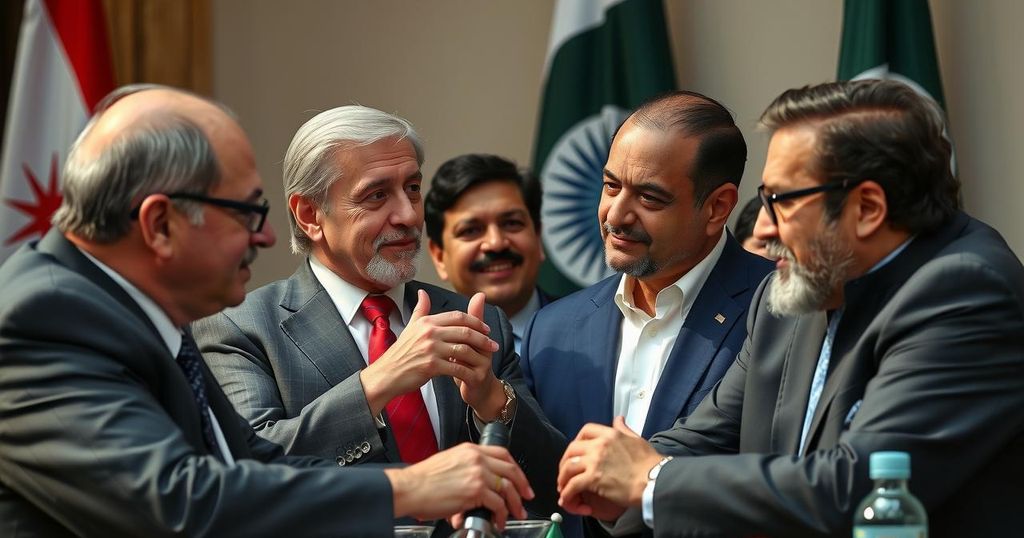Argentina has achieved remarkable economic recovery under President Javier Milei, reducing inflation dramatically, which has prompted some in Pakistan to seek a similar leader. While Milei’s policies provide hope, his personal biases and interpretations of economic history are areas of concern. Pakistan’s path forward requires both bold reforms and a commitment to fairness and informed policy.
Argentina and Pakistan, once significant players in their respective regions, face strikingly similar economic dilemmas rooted in decades of turmoil. Javier Milei, who ascended to the Argentine presidency, has been characterized by his radical policies that have achieved an unprecedented economic turnaround, reducing sky-high inflation from 211 percent to single digits. Many in Pakistan yearn for a leader akin to Milei who possesses the audacity to challenge the status quo and address the nation’s chronic economic issues.
Milei’s approach includes slashing bureaucratic layers and fiscal deficits, reassuring listeners that such reforms can uplift purchasing power and mitigate poverty. He rightly criticizes price controls that only serve to create an illusion of stability and recognizes the harmful consequences of corruption stemming from state-sponsored projects. Numerous parallels arise when considering Pakistan’s economic challenges, which often mirror those of Argentina under Milei’s governance.
However, while Milei possesses commendable economic insight, his personal biases and historical interpretations may raise concerns. His endorsement of the United States and Israel as models of liberal democracy reveals a troubling disconnect, particularly given the ongoing Palestinian struggle for rights. Such claims question his commitment to the ideals of freedom he professes to uphold.
Additionally, Milei’s interpretations of economics, especially his views regarding the Industrial Revolution and the contributions of historical figures such as Adam Smith, bear inaccuracies. His admiration for Austrian economic theories is juxtaposed with flawed historical readings, such as attributing simple prosperity to the Industrial Revolution while neglecting the harsh realities faced by laborers of that era. This raises legitimate doubts about his credibility in championing free market principles.
In reference to Pakistan, there is indeed a dire need for leadership that recognizes the complexities of both economics and history. A leader with Milei’s boldness could dismantle convoluted regulations hindering growth while offering a morally sound governance model. It is essential, however, that this leader distills the positive aspects of Milei’s approach while rejecting the less favorable elements of his ideological stance and historical interpretations. Serving the interests of the public demands a careful balance of insightful economic policy devoid of partisan biases.
Ultimately, both nations strive for economic stability, and while Milei may inspire the Pakistani populace to seek transformative change, they must remain vigilant against adopting perspectives fraught with bias and misinformation. The essence of leadership should focus not solely on radical reforms but also on an unwavering commitment to equality and understanding intricacies of economic theory and history.
Argentina has historically faced significant economic challenges, often leading to its dependence on entities like the International Monetary Fund (IMF) for bailouts. Recent political developments, particularly the rise of Javier Milei, have offered a ray of hope as he implements radical economic reforms. Pakistan, too, remains mired in economic struggles and looks towards Milei as a potential model to emulate. The comparison reveals important insights about leadership, economic policy, and the socio-political landscape both countries navigate.
In conclusion, while Javier Milei has successfully implemented transformative economic reforms in Argentina, his contentious viewpoints and historical inaccuracies warrant caution. Pakistan’s search for effective leadership should draw inspiration from Milei’s boldness but must steer clear of ideological biases that compromise integrity and understanding. A prudent assessment of economic and historical contexts will ensure that future leaders can successfully navigate their nations toward stability and prosperity.
Original Source: www.dawn.com






